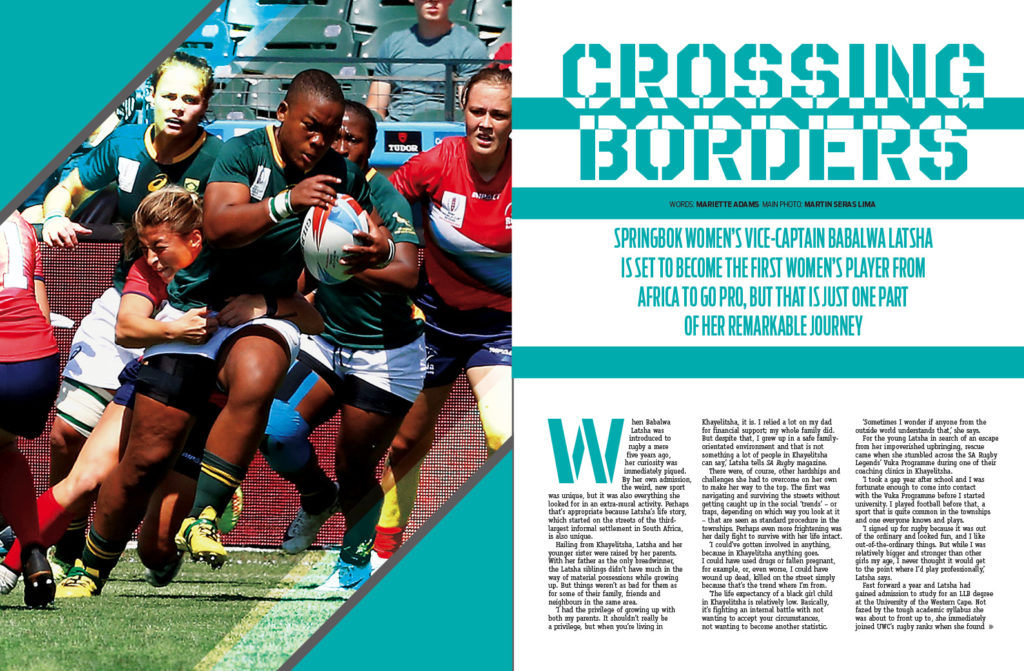Springbok Women’s vice-captain Babalwa Latsha could become the first women’s player from Africa to go pro, but that is just one part of her remarkable journey, writes MARIETTE ADAMS.
When Latsha was introduced to rugby a mere five years ago, her curiosity was immediately piqued. By her own admission, the weird, new sport was different and unique, but it was also everything she looked for in an extra-mural activity. Perhaps that’s appropriate because Latsha’s life story is also different and unique, and which started on the streets of one of the most notorious townships in South Africa.
Hailing from the Khayelitsha, the third largest informal settlement in South Africa, Latsha was raised along with her younger sister by both her parents. With her father as the only breadwinner, the Latsha siblings didn’t have much by the way of material possessions while growing up. But things weren’t as bad for them as for some of their family, friends and neighbours in the same area.
‘I had the privilege of growing up with both my parents. It shouldn’t really be a privilege, but when you’re living in Khayelitsha, it is. I relied a lot on my dad for financial support, my whole family did. But despite that, I grew up in a safe family-orientated environment and that is not something a lot of people in Khayelitsha can say,’ Latsha tells SA Rugby magazine.
There were, of course, other hardships and challenges she had to overcome on her own to make her way to the top. The first was negating and surviving the streets without getting caught up in the social ‘trends’ – or traps, depending which way you look at it – that are seen as standard procedure in the townships; perhaps even more frightening was her daily fight to survive with her life intact.
‘I could’ve gotten involved in anything, because in Khayelitsha anything goes. I could have used drugs or fallen pregnant, for example, or even worse I could have wound up dead, killed on the street simply because that’s the trend where I’m from. The life expectancy of a black girl child in Khayelitsha is relatively low. Basically, it’s fighting an internal battle with not wanting to accept your circumstances, not wanting to become another statistic. Sometimes I wonder if anyone from the outside world understands that,’ Latsha says.
For the young Latsha in search of an escape from her impoverished upbringing, her rescue came when she involuntarily stumbled across the SA Rugby Legends’ Vuka Programme during one of their coaching clinics in Khayelitsha.
‘I was fortunate enough to come into contact with the Vuka Programme, which was just before I got into university because I took a gap year. I played football before that, a sport that is quite common in the townships and one everyone knows and plays. I just signed up for rugby because it looked fun and out of the ordinary, and I like out of the ordinary things. But while I was relatively bigger and stronger than other girls my age, I never thought it would get the point where I’d play professionally,’ Latsha says.
Fast forward a year and Latsha had gained admission to study towards an LLB degree at the University of the Western Cape. Not fazed by the tough academic law-based syllabus she was about to front up to, she immediately joined UWC’s rugby ranks when she found out the institution had a women’s team. Her development improved at a rapid pace as did her alertness and competitive nature. With a relatively small circle in the women’s game, word quickly spread of the firecracker prop.
Soon Latsha played at club level for UWC and for Western Province at provincial level. Yet somehow, she successfully managed to balance her congested schedule.
‘It was crazy. I had to rush from class to training on most days. Then when I’d return home at night it was quite late and I had to manoeuvre my way around hotspots so I could get home safely and in one piece before burning the midnight oil studying so I could get through the exams. I used whatever spare time I had to study, like when waiting for a train, I’d pull out a textbook and try to get as much in my head as possible,’ she says.
But forging her own path in a male-dominated sport was frowned upon by those closer to home.
‘It’s tough for someone from that area to be able to build yourself up as a brand and specifically a sportswoman. Before, I was ridiculed for what they perceived as being too muscular. Later they mocked me, asking why I played rugby and not football which was apparently better suited for someone like me. I just couldn’t win and that was even more reason to carry on in this sport and make a success of it.’
By way of defusing the critics’ misinterpretation of her work, Latsha won national colours in sevens and fifteens and graduated with an LLB degree all within five years since she first picked up a rugby ball. She played at the Women’s Sevens World Cup in San Francisco in July 2018 and was fully capped when she turned out for the Springbok Women in a three-Test tour of Europe after the team’s four-year hiatus from the international arena.
But that’s just part of her success story. She made such an impression on that tour that the English champions, Saracens, came circling in Cape waters to lure Latsha abroad. Negotiations to make her the first woman from the far reaches of Africa to play in Europe as a full-time professional are at an advanced stage and Latsha is confident the deal will be wrapped up by August.
‘They are keen to bring me on board and I’d like to join their club. It’s just a matter of sorting out the logistics. England is thousands of kilometres away, so my stay there has to be as comfortable as possible and it has to be lucrative because I’ll be playing as a professional. Those are the things we are trying to fine-tune and then hopefully in a few weeks I’ll be scooting to that side.’t is unclear how long Latsha will be at Saracens for, but she is certain that she also wants to start building her profile as an attorney while in London.
‘It depends entirely on the final contract, but I might go for a season or two, and after that we’ll see. Ultimately, in the near future I’d like to practise law but for now the aim is to play as much rugby as possible while I still can. But having an educational background in law, I’d like to merge the two. I’m thinking of applying for work at a couple of law firms in the UK. Having something like that on my CV will be great.’
There’s no denying the fairytale aspect of Latsha’s story. That much is evident in the contrast between how her life turned out compared to the average girl in South African townships. But she embraces the harsh realities of her upbringing, rather than looking to escape them.
Latsha runs several coaching clinics and mentorship programmes in her old area and works as a gym instructor and part-time sports show host at a community radio based in Khayelitsha.
‘I found a way out of that upbringing through rugby and getting an education, but somehow, your roots always finds their way back to you. One of the most important things is to try to associate yourself with people who share a similar goal or dream as yourself. I try to plough back into the community with my presence, because it’s important for kids to have some kind of point of reference and to know that as much as they’re in a bad situation physically, their minds shouldn’t be.’
SIDEBAR:
COACH STANLEY RAUBENHEIMER ON …
LATSHA AS A PLAYER
‘She’s a hard-working, no-nonsense type of player and for her position that is what you need. She’s just a very good rugby player. Her core skills are good – obviously there’s always room for improvement – but she carries the ball well, she tackles well and has a good work ethic. Those are the characteristics I need in a player. Babalwa is a student of the game, who is sometimes too intense in terms of trying to learn and get everything right instead of enjoying the process. She enjoys her job as a rugby player, but sometimes I wish she would have more fun on the field because it’s important to find pleasure in the things you involve yourself in. I asked her to do a cross-kick from one side of the field to the other. There was no back chatting; she just did it and, satisfied that she got it right the first time, Babalwa got on with whatever she was busy with before. Apart from her competitive streak, she is a well-mannered and honest person.’
HER MOVE TO SARACENS
‘It’s good for Babalwa and for women’s rugby in South Africa. Saracens’ interest highlights her talent. The fact the English club champions are looking at one of our players is something I’m proud. Hopefully this ground-breaking move is seen as such and paves the way for many other local players to join clubs in Europe that are fully professional. The women’s game is still in an amateur phase locally and the girls earn way little for the work they do. So if they can make a living abroad, they should do it because they deserve it.’





